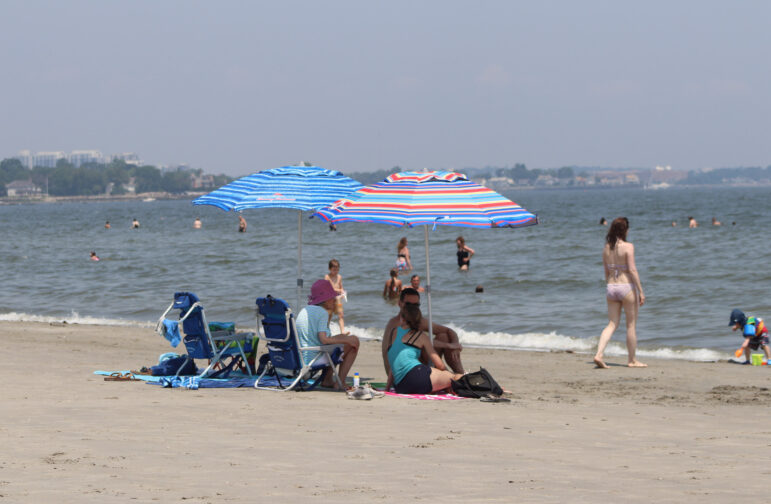On Friday the Planning & Development Committee of the CT General Assembly discussed HB 6650, which would limit beach towns from charging non-residents fees more than 50% of what residents pay.
The bill, “An Act Concerning Public Access to Certain Coastal Resources” was a reprise of similar bills championed by State Rep Roland Lemar (D-96) who represents New Haven.
Lemar described fees as exorbitant, ridiculous and discriminatory. He noted one beach town charges $25 for a season pass for residents and $775 for non-residents.
“The legislation, if passed, we’d have to turn away more residents. It wouldn’t impact the people in $3 million houses, it would impact the residents I represent.”
– State Rep Steve Meskers (D-150)
Among those who testified were Greenwich First Selectman Fred Camillo, State Rep Steve Meskers (D-150) and Hector Arzeno (D-151).
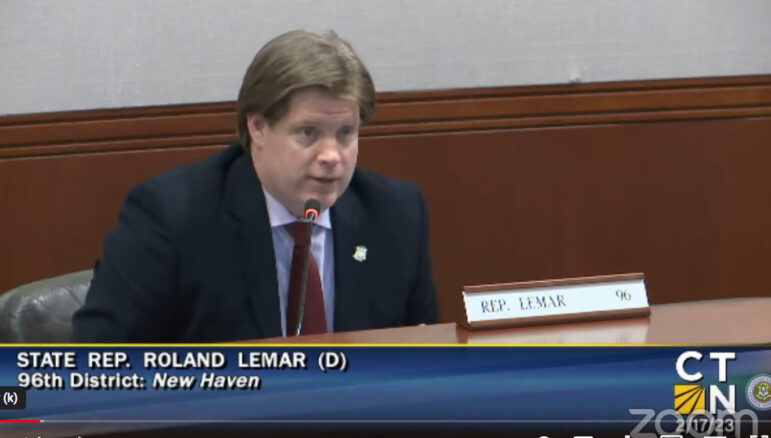
Lemar asked how the Greenwich’s fees were vetted.
Camillo said back in 2001 a non-resident sued the town for access to Tod’s Point after being turned away at the gate. Greenwich lost the lawsuit.
“My contention is when you create a fee structure that is so out of balance with a person’s ability to pay, you create a de facto restriction on non-resident members of a community ever accessing that beach.”
– State Rep Roland Lemar (D-96)
“A court decree said Greenwich could absolutely charge fees, but they had to be reasonable,” Camillo said, adding that town departments assessed what portion of taxes went to maintaining parks and beaches and then came up with reasonable fees.
He said the fees were “in line with” neighboring towns, and that Greenwich did not take state or federal assistance to maintain its beaches.
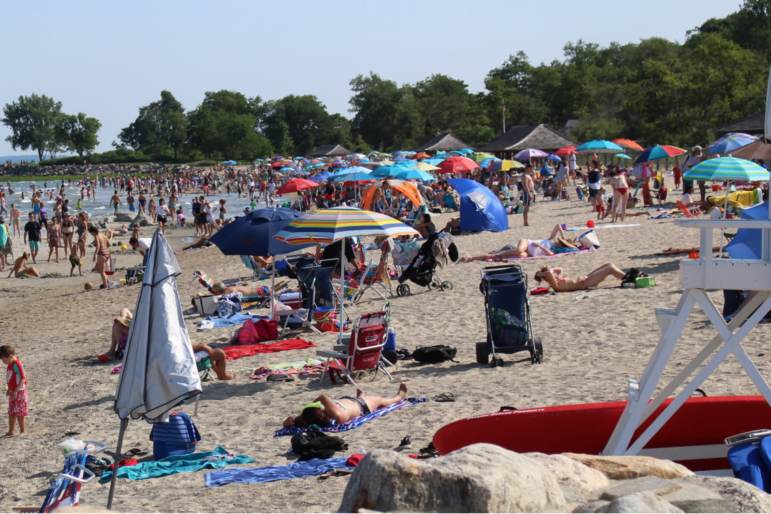
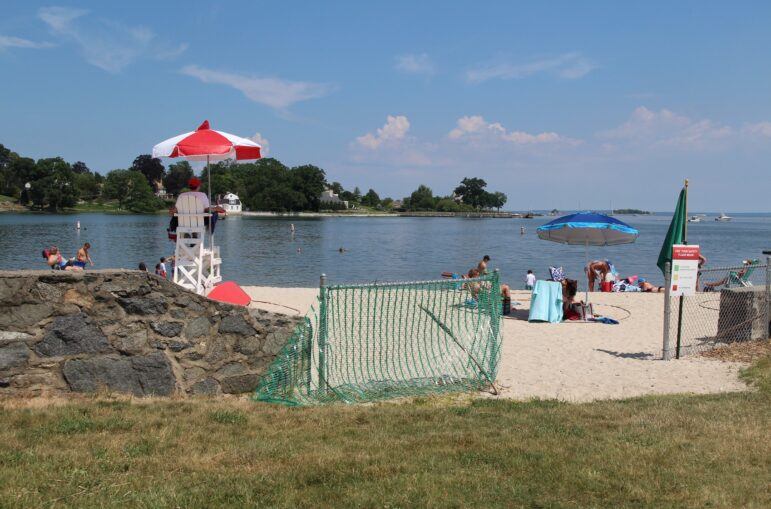
Rep Lemar pushed back. He said he had emails to prove that parks directors intentionally aligned their prices to keep them high, and keep non-residents out.
“These folks are kind of talking with each other. So I do worry when people say we’re in line with our surrounding communities,” Lemar said. “Yes, of course, because surrounding communities are all getting together to come up with a fee structure.”
“We’re not colluding with anybody else,” Camillo said, adding that Greenwich also operates ferries and a beach in the Byram at a deficit. Non residents are allowed on the ferries and at Byram Beach.

Lemar acknowledged that Greenwich did not receive funding from the state, but other beach communities did.
Moreover, he said the state and federal government invest heavily in the health of Long Island Sound, to the benefit of beach towns.
“Connecticut’s shoreline is the most privately owned shoreline in the country, and public access is largely gated public access based on your ability to buy a home in some of the wealthiest communities in the country,” Lemar added.
In an exchange with Senator Tony Hwang of Fairfield (R-28) Camillo said Greenwich had paid to restore dunes, causeways and roads after storms, as well as repair damage to docks and islands.
In addition, he noted he town funds a police presence at the beach, as well as guards at the gatehouse.


Beaches already at Capacity
Greenwich officials said on nice summer weekends Tod’s Point reaches capacity, and both residents and non-residents are turned away. The park has 1100 parking spots.
Meskers’ district runs along the shoreline from New York to Stamford, and includes both Tod’s Point and Byram Beach, which he said provided best access to his most disadvantaged constituents.
He said his about 50% of the school population in his district received free and reduced lunch, and was home to several public housing projects.
“I’m trying to provide access to my vulnerable residents and I think this bill is of detriment to them,” Meskers said.
He noted that Byram Beach was frequently closed due to pollution, and swimmers are rotated out of the pool after an hour or two when it hits its 275-person capacity.
“Of my town of 63,000 there are numerous private golf clubs and a couple private beach facilities. The only public facilities available to the majority of my population are those two beaches. The capacity issues are already extant,” Meskers said.
Meskers said he believed the proposed fee structure would overwhelm Greenwich facilities with out-of-state residents and deny his disadvantaged residents access to the beach.
“I was elected to represent my district,” he said. “I am responsible on my sworn duty to represent the residents of the state, but I certainly was not elected to represent New York residents.”
Meskers suggested the state had both the responsibility and duty to consider acquisition of properties as they become available to build more public beaches.
Lemar asked if Meskers would be more amenable to the legislation if it was limited to Connecticut residents.
Meskers demurred.
“If you can limit it to Connecticut residents you still haven’t addressed my concern, which is the primary beach that serves part of the constituency that I think is the most disadvantaged is already at capacity.”

Access to an Incredible Natural Resource
Lemar pressed on with his argument that non-resident fees were prohibitively expensive and to buy a house and qualify to purchase a resident beach pass costs millions of dollars.
Senator Hwang talked about the perception that everyone in Greenwich was wealthy.
“And we have colleagues that reinforce that imagery of multi-million dollar homes,” Hwang said.
“In this country when you think about diversity, equity and inclusion, it resonates with me,” Meskers said. “In Greenwich we are much more diverse than the moniker gives us…The hunger and poverty issues are real.”
“My point is I don’t have enough access for my population as it is, and I already provide access for out-of-staters and out-of-towners,” he added.
Rep Arzeno asked Rep Lemar if he had suggestions on how to deal with limits on capacity.
“I never suggested that a town couldn’t establish capacity limits,” Lemar replied. “It’s about the discriminatory process of who is allowed onto that beach prior to capacity limit being reached.”
Arzeno noted that for several months of the year there are no requirements to enter the beach at all.
“Connecticut Supreme Court’s determination is that the constitutional rights of Connecticut residents is not limited by whether it is sunny and warm that day,” Lemar said.
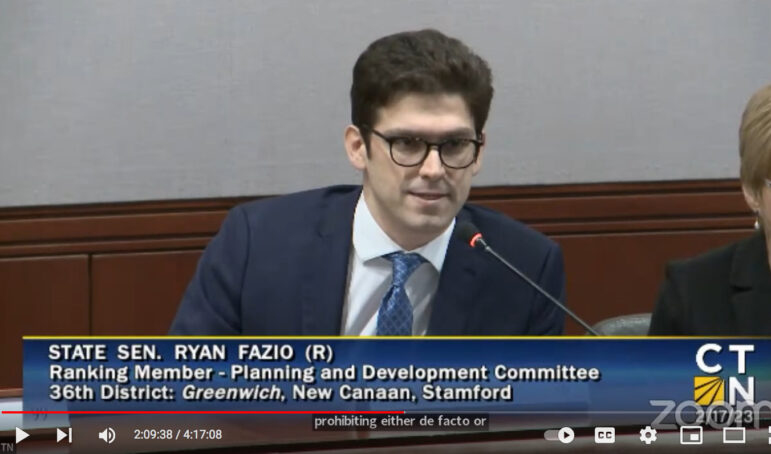
Senator Ryan Fazio said said Rep Lemar brought up a good point about Constitutional rights.
“Under the state Supreme Court ruling of the State…it’s already illegal to set unreasonable fees for non-residents, and if someone took issue with the current policies, then they’d have recourse through the legal system. The fact there hasn’t been a lawsuit since the one in 2001 is evidence that the current policies are maybe not perfect, but reasonable.”
Peter McGuinness, a resident of Darien said he opposed the bill. He noted that $5.00 of everyone’s Connecticut-registered vehicle covers a “Passport to the Parks” and can park free of charge at all CT State Parks and Forests year-round.
He shared the math: $5.00 divided by 365 days is 1.367¢ a day.
“Someone with a New York license plate is charged $22 during the weekend in peak summer season. That’s 160,500% more for a non resident.”
McGuinness noted that like town beaches, Sherwood Island fills to capacity on sunny summer weekends.
Susan Helpern from the south end of Stamford said her city was the second largest in the state, with a population over 135,000 people.
She said in the past two years thousands of new residents moved into recently completed high rises, and 89% of the residents have cars according to the Census.
But she noted the size of the parks and beaches had not changed.
“All the neighboring streets of our parks and beaches have been overtaken with cars, often leaving residents with no place to park themselves,” she said. “Parking regulations have been instituted in some areas to allow 2-hour parking only, but of course enforcement can be difficult because it requires more manpower.”
“Alcohol and bottles, ball playing, and boom boxes are becoming the norm and cannot be acceptable. Allowing easier access by lowering fees does not seem the best way to go,” Helpern said.
